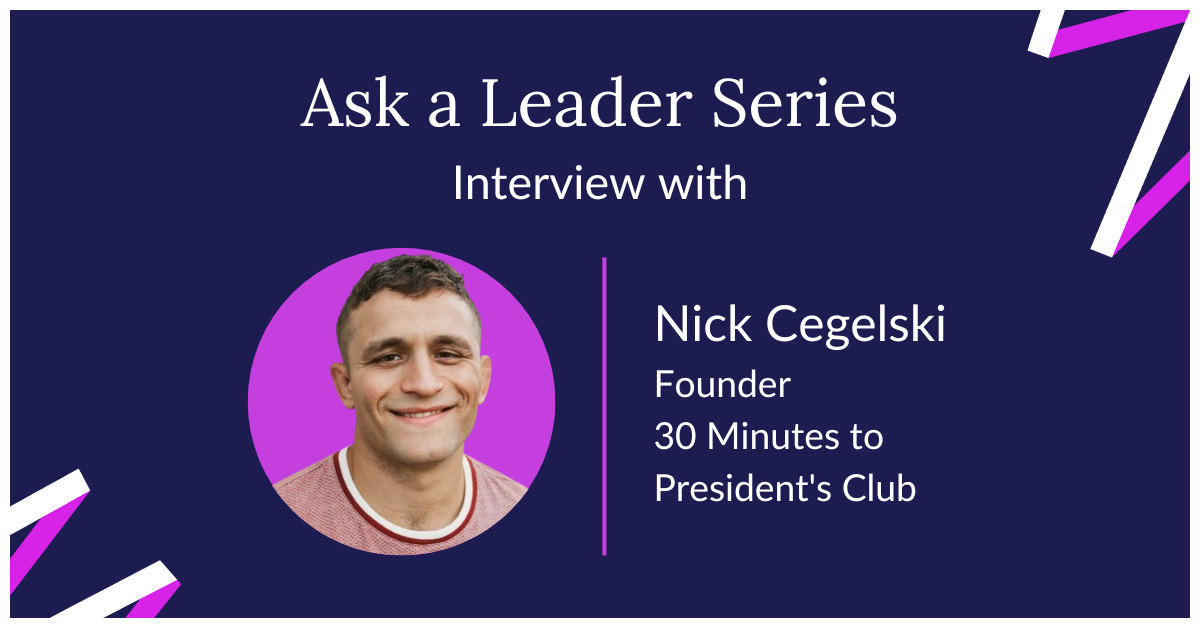In this exclusive interview, Nick Cegelski from 30 Minutes to President's Club talks about trends he's seeing in sales right now, advice for new sales reps, how to end a demo call, the importance of sales & CS collaboration, and the biggest mistake he's made in his career.
1. What trends are you seeing in sales right now?
I think there are a lot of salespeople out there who are struggling to give their buyers a good meeting, aka the buyer leaves an experience with the seller and they think that 30-minute interaction wasn't really a great use of their time.
And there are a lot of different ways salespeople should be working to affect this. Some of the ways you can give a good meeting:
1) Set a really clear agenda upfront where you cover three main things: the amount of time that you have set aside for the interaction. It's not a good interaction if you go eight minutes over and then they're late for their next meeting.
2) You address the content for the meeting. You might say something like, "I've got us down to cover a, b, and c today, is there anything else that you really want to make sure that we cover or addressed in today's meeting?" You give the buyer a chance to voice what they want to get out of the meeting.
3) You allude to the end of the meeting, where you'll carve out time to talk about next steps. So you might say, "given that we have a stop at 2:30, are you cool if we end five minutes early to talk about where we might go from here?" And what you're doing is you are setting aside intentional time to cover the content of the meeting. But you're also setting aside intentional time to talk about where we go from here, even if where we go from here is we gracefully part ways.
So I think a big trend is buyers are having a crummy experience with salespeople. And it's so easy to solve. It's as simple as the seller saying, "Hey, how can I make sure that this 30-minute interaction is a valuable use of your time?"
2. What's one piece of advice you'd give to a new sales rep?
There are a lot of salespeople that have this picture in their head of what a great salesperson is; somebody who's tall and good-looking and they've got a lot of charisma and bravado, and they come in and always have the right answer.
And I actually think a lot of salespeople try to put that costume on them themselves. They try to act like that when that's not who they are. And that actually really turns a lot of buyers off: when you show up beating your chest and being uber-aggressive. It's kind of weird.
The best salespeople I've met are sometimes a little more reserved, they're often more thoughtful, they're often not the ones who immediately get what the buyer's saying, which seems counterintuitive because you would think that the salespeople that are the "smartest" are the ones who do the best as sellers.
But actually, the best salespeople are the ones who ask the customer, "Hey, can you clarify what you meant by that?" Or "you said that lead generation is important to you. I found that lead generation means different things to different people. Can you give me a sense of what that means for you?"
You should not be the salesperson who instantly understands what the buyer means every time, because people communicate and have different definitions of terms. And so drop the bravado; it's okay to not always have the answer right away. And it's okay to tell the buyer, "I did not understand what you just said. Could you help me understand that? Could you rephrase that?"
3. How do you typically end a demo call?
If you think about ending a demo call and the first time that you address next steps is at the end of the demo call, you've actually made an error.
I talked about earlier, in the agenda, you should be talking about the next steps at the end of the meeting. And so you have to allude to that in the beginning. So at the beginning of the meeting, when I'm setting my agenda, let's say I'm showing a software demo, I'm going to say to the buyer, "Hey Dave, typically these demos that we do end up going one of two ways. You might see the software and say, 'Hey, this isn't a fit for us, I don't like it,' and if that's the case, you won't hurt my feelings. I'm not the guy who built the software, I'm the guy who's gonna show it to you. The other outcome might be that you say, 'this looks relatively interesting, it might be worth doing some deeper due diligence on this.' If that's the case, usually what folks will want to do next is they're going to want their IT team to do a security review to make sure this matches all of our specifications, etc. I guess given that we have a stop at 2:30 today, are you cool if we end at 2:25 to talk about whether or not we move to that next step?"
Now keep in mind, I'm saying that at the beginning of the meeting. I'm saying this stuff up front. The buyer's always gonna say, "sure, yeah, we can carve out time to make a no or no-go decision." And if they don't agree with that, you should have a conversation upfront about well, "what do you see the outcome of this being like? If that's not the next step, where should we go?"
Or if they say, "Hey, we're not going to be able to decide today," that's okay. But at least now you have some clarity in the situation.
But 85% of your prospects will say, "no problem, let's end five minutes early and talk about that." And then it's pretty easy. In the last five minutes, you say, "Hey, we're at 2:25. I know in the beginning we talked about you seeing this thing and saying you didn't like it or saying that this might be worth exploring. How are you feeling?"
Simple, easy, but the key is not the magic words you say at the end. The key is you let them know the ask for a discussion around next steps is coming upfront.
4. Why is it crucial for sales & customer success to work together?
I have a saying which is, you should never win a deal alone and you should never lose a deal alone. And what that means is if you are going through an evaluation process with a buyer where they're looking at your thing and going through demos and meetings, and you're the only person that the customer is interacting with, you're giving them a preview into how your organization operates.
And most people want to work with an organization that has a team and that's collaborative.
And I think it's a sign of hubris or ego if you're not pulling your teammates in. You can actually take a lot of pressure off of yourself as a salesperson when you bring in subject matter experts from CS, for example.
One of the biggest worries that people have when they're buying software is, "is this going to be a crummy implementation? What's customer success going to be like? What's implementation going to be like?" And you can alleviate so many of their concerns by giving them a preview into what the post-buying experience is going to be like.
But you're not the master of that domain, and you shouldn't pretend to be. You should bring in the experts to do that.
The other thing is–and I've learned this because I run sales and customer success for my organization–you will throw worse deals over the fence when you bring CS in to help you. They'll say, "Hey, wait, there's a concern here, we should alleviate it upfront." And then they're going to be more willing to help you.
And so when CS is willing to help you, you're going to have a way better selling experience, and you'll actually win more business. So it can be hard sometimes to find the time that works on everybody's calendar. But never, never, never try to win a deal alone. And that will keep you from losing a deal alone.
5. What's the biggest mistake you've made in your career?
Early in my career, I fell victim to what I talked about earlier, where I had this picture in my mind of what a great salesperson was like. And I tried to be that person instead of being myself.
Now, I want to caution folks: When you hear "Be yourself," people think they can just show up on a sales call unprepared. And that's not the case. You still should be educating yourself and learning about best practices and watching videos like this and trying to understand the intent behind some of those talk tracks I shared.
What you shouldn't attempt to do is change your personality, or act in a way that's not congruent with what's going on within you.
One way that I've screwed this up in the past is, I'd be on a meeting with a customer and I'd have this feeling in my stomach where it's like, something's wrong with this deal, right? Like I can tell one of the people is really unengaged. And before, I would shy away from calling it out, but now I try to lean into the phrase, "If you sense it, say it. If you feel it, say it."
And so I don't have a problem now on a demo, saying, "Hey, Sandy, I haven't heard much from you. I'm kind of getting the sense that you might not be crazy about these reporting dashboards that I'm showing you. Am I totally off base with that?"
The intent here is if I have a feeling about something that might throw my deal off, I'm gonna call it out. I'm not being a jerk, but you have to call it out, you have to be yourself. You have to be true to yourself in a way that matches psychological best practices of selling.
Check out this interview with Will Allred from Lavender for more expert tips & advice.




